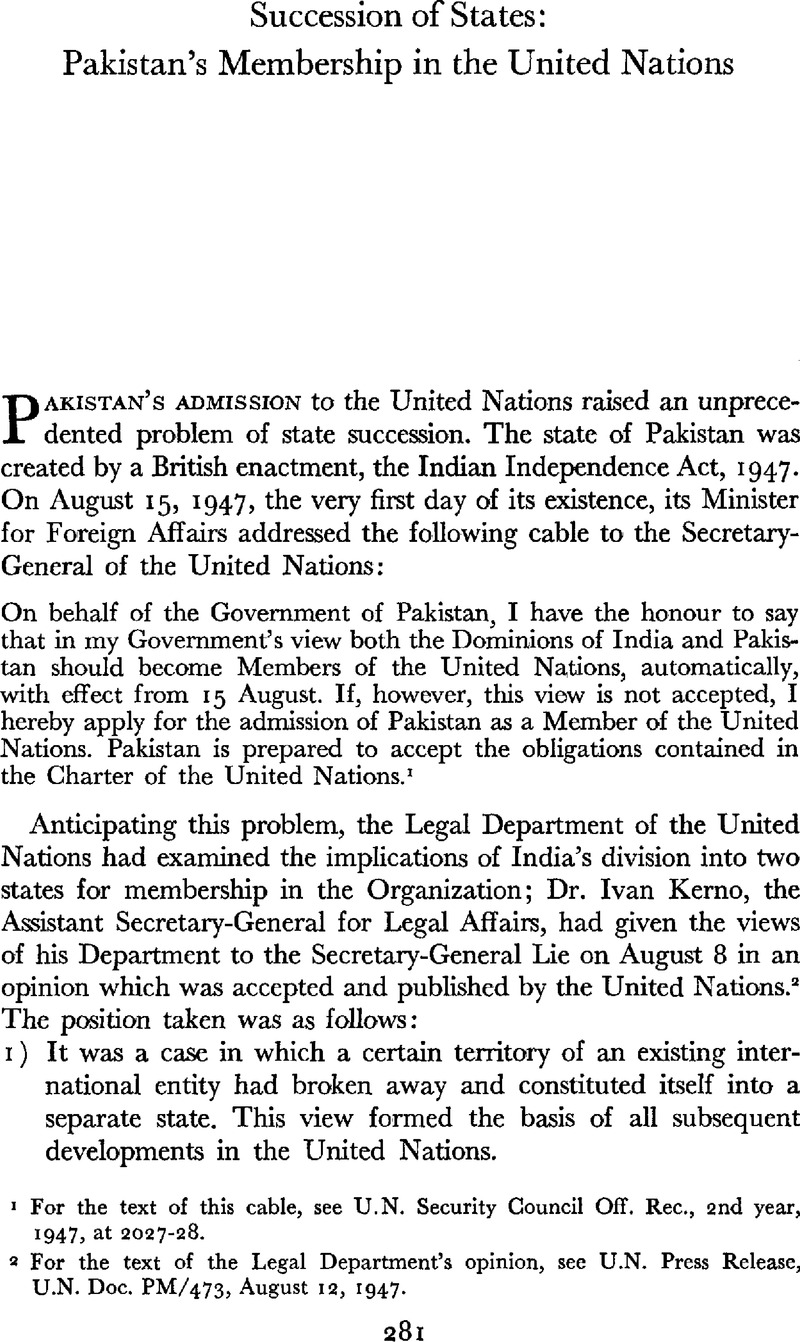No CrossRef data available.
Article contents
Succession of States: Pakistan’s Membership in the United Nations
Published online by Cambridge University Press: 09 March 2016
Abstract

- Type
- Notes and Comments
- Information
- Canadian Yearbook of International Law/Annuaire canadien de droit international , Volume 3 , 1965 , pp. 281 - 289
- Copyright
- Copyright © The Canadian Council on International Law / Conseil Canadien de Droit International, representing the Board of Editors, Canadian Yearbook of International Law / Comité de Rédaction, Annuaire Canadien de Droit International 1965
References
1 For the text of this cable, see U.N. Security Council Off. Rec, 2nd year, 1947, at 2027–28.
2 For the text of the Legal Department’s opinion, see U.N. Press Release, U.N. Doc. PM/473, August 12, 1947.
3 See Partition Proceedings, Government of India, New Delhi, 1948, Vol. 3, at 203.
4 Ibid.
5 Ibid., 206. This view was taken by Messrs. Pai, Menon and Jha. They based their contention on the ground that (a) cl. 2 of the Indian Independence Act gave all territory of India to India except certain specified areas; (b) nearly three quarters of the territory including the capital of the state would continue with new India and loss of territory does not affect the international personality recognized by international law; (c) no revolution has made India’s international personality extinct; (d) His Majesty’s Government had recognized this position. For more details, see ibid.
6 Ibid., 207.
7 Ibid., 287.
8 The text of the Note may be seen in ibid., 289.
9 Ibid., 289–90.
10 Ibid., 292.
11 Ibid. He further said: “… to do so would be to create an awkward international precedent.”
12 See U.N. Gen. Ass. Off. Rec, 2nd Sess., 1947, 6th Comm., 308–11.
13 Ibid., 308.
14 See supra note 1, at 2055.
15 Yuen-Li, Liang, “Notes on Legal Questions concerning the United Nations,” (1949) 43 Am. J. Int’lL. 134, 146.Google Scholar
16 U.N. Gen. Ass. Off. Rec, 2nd Sess., 1947, 1st Comm., 3–4. Mr. Arce was pleading for equality of treatment for the two Dominions, India and Pakistan; either both should become U.N. Members automatically or both should apply afresh for membership.
17 Ibid., 582.
18 U.N. Gen. Ass. Off. Rec, 2nd Sess., 1947, Plenary Meetings, 317.
19 Ibid.
20 U.N. Gen. Ass. Off. Rec, 2nd Sess., 1947, 6th Comm., 41.
21 Ibid., 38.
22 See the speech of Brigadier Low, 440 H.C. Deb. (5th Ser.) 41 (1947).
23 See the speech of Mr. Molson, ibid.
24 Ibid., 44.
25 Many members of the U.N. were unhappy particularly because the New York Times (August 13, 1947, at 11) had reported that Dr. Kerno “ruled” this. The U.N. Secretariat took pains to explain in the Sixth Committee that it was wrong to say that Dr. Kerno had “ruled.” He had simply given a legal opinion on the basis of the conclusions arrived at by the Legal Department and it was meant to furnish guidance to the Secretary-General. For details, see U.N. Gen. Ass. Off. Rec, 2nd Sess., 1947, 6th Comm., 304–05.
26 See “Notes: Admission of Pakistan to the United Nations,” Pakistan Horizon, vol. IX (1956), at 95.
27 Ibid.
28 The precise reasons for this inconsistency are difficult to explain but some inkling into the working of the mind of the British government can be had from the following statement of Lord Mountbatten: “The fear was that a country might borrow money much in excess of her needs, then go through a formal partition and claim that neither part of the divided country was responsible for the debts incurred.” See Partition Proceedings, op. cit. supra note 3, at 292.
29 Ibid.
30 See Gwyer, , SirMaurice, , and Appadorai, A.,: Speeches and Documents on the Indian Constitution, 1921–47, Vol. 1, at 320 (Oxford University Press, 1957).Google Scholar
31 The name “Partition Council” in itself is suggestive of this meaning.
32 See Oppenheim, I, International Law 164 (8th ed. Lauterpacht, , Longmans, 1962).Google Scholar
33 See Section 4 of the Schedule to the Order, op. cit. supra note 12, at 310.
34 The history was repeated in 1961 when Syria resumed her seat in the U.N. after defecting from the U.A.R. In this case also, the issues involved were neither adequately discussed nor clarified: see Young, Richard, “The State of Syria: Old or New?” (1962) 56 Am. J. Int’l L. 482, 485.CrossRefGoogle Scholar


